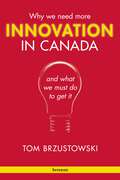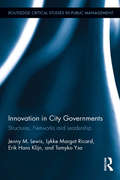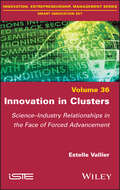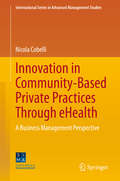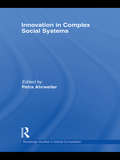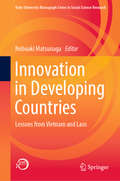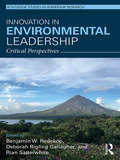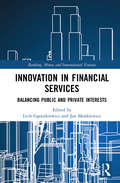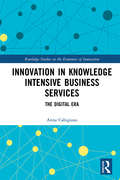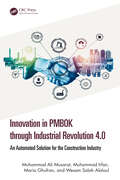- Table View
- List View
Innovation in Business Education in Emerging Markets
by Ilan Alon John R. Mcintyre Victoria JonesEmerging market economies account for eighty percent of the world's population and some 75% of its trade growth in the foreseeable future, following US Department of Commerce data. This volume provides insights for success in rapidly growing education markets that can be used by educators, administrators, policy makers and planners.
Innovation in Canada: Why We Need More and What We Must Do to Get It
by Thomas BrzustowskiCanada has a prosperity problem because we don t create enough wealth. Business as usual is not a solution; we need to create more value in new ways - that s innovation. But beyond innovation to solve our current problems, we must learn how to innovate in new ways to deal with whatever future pressures and opportunities arise from global demographics and climate change. Innovation in Canada demystifies innovation and presents its many aspects in one big picture. The book proposes innovation in both goods and services as the means for increasing the value of what the Canadian economy produces. This will raise our prosperity and show up as improved productivity. Written in plain language and illustrated with corporate data, the book underlines the essential roles of technology, entrepreneurship and commerce. It points out important differences between innovation in established firms and innovation in new ventures, whose time scales are shorter and whose needs are more urgent. Innovation in Canada proposes the elements of a supportive government innovation policy, and it outlines the different design principles for government assistance programs needed to provide effective support to the two different groups of innovative companies.
Innovation in Capitalist Economies: Crises, Challenges and Opportunities (Routledge Frontiers of Political Economy)
by Faruk Ülgen Lyubov KlapkivInnovation is critical to increasing global prosperity and also essential to surviving and overcoming the ongoing challenges of pandemics, wars, climate change, and systemic financial turmoil.At the same time, major corporations seek to transform new knowledge and scientific progress into profitable innovations and to increase their influence over society. But if, as these firms claim, this tremendous innovativeness has a positive long-term effect on our lives, who ultimately pays the price for this development? This edited volume tackles issues related to innovation dynamics of modern capitalist economies, exploring the nature, the effects and the dynamics of innovative behaviour and the social impact of related policies. The first part of the book includes chapters on the selected drivers of innovative changes that driven by companies. The focus is made on organizational and financial determinants of innovations as well as on creative communities and social cooperation in networks that promote creative decisions. The second part is devoted to the innovations that play a role in the creation of added value and new financial solutions that allow companies to keep their vitality under the pressure of multiple events such a pandemic, climate policies, or growing geopolitical risk. Together, the contributors explore the various impacts of innovation on the way we are organizing capitalist economies in the 21st century.This book will be of great interest to readers of the political economy of financial and economic development, innovation, banking and finance studies, economic policy, and economic crises.
Innovation in China: The Chinese Software Industry (Routledge Contemporary China Series)
by Shang-Ling JuiA key question for China, which has for some time been a leading global manufacturing base, is whether China can progress from being a traditional centre of manufacturing to becoming a centre for innovation. In this book, Shang-Ling Jui focuses on China’s software industry and examines the complete innovation value chain of software in its key phases of innovation, standards definition, development and marketing. He argues that, except for software development, these key phases are of high added-value and that without adopting the concept of independent innovation as a guiding ideology, China’s software enterprises – like India’s – would have an uncertain future. In other words, the lack of core competence in the development of China’s software industry might restrain the industry from taking the leading position and drive it towards becoming no more than the software workshop of multinationals over the long term. Shang-Ling Jui contends that China’s software industry should and can possess its own complete innovation value chain. Having worked in China’s software industry for many years, the author provides an inside-out perspective – identifying the strengths and weaknesses of the industry and defining the challenges in China’s transition from "Made in China" to "Innovated in China."
Innovation in City Governments: Structures, Networks, and Leadership (Routledge Critical Studies in Public Management)
by Erik Hans Klijn Jenny M. Lewis Lykke Margot Ricard Tamyko Ysa FiguerasInnovation has become an important focus for governments around the world over the last decade, with greater pressure on governments to do more with less, and expanding community expectations. Some are now calling this ‘social innovation’ – innovation that is related to creating new services that have value for stakeholders (such as citizens) in terms of the social and political outcomes they produce. Innovation in City Governments: Structures, Networks, and Leadership establishes an analytical framework of innovation capacity based on three dimensions: Structure - national governance and traditions, the local socioeconomic context, and the municipal structure Networks – interpersonal connections inside and outside the organization Leadership – the qualities and capabilities of senior individuals within the organization. Each of these are analysed using data from a comparative EU research project in Copenhagen, Barcelona and Rotterdam. The book provides major new insights on how structures, networks and leadership in city governments shape the social innovation capacity of cities. It provides ground-breaking analyses of how governance structures and local socio-economic challenges, are related to the innovations introduced by these cities. The volume maps and analyses the social networks of the three cities and examines boundary spanning within and outside of the cities. It also examines what leadership qualities are important for innovation. Innovation in City Governments: Structures, Networks, and Leadership combines an original analytical approach with comparative empirical work, to generate a novel perspective on the social innovation capacity of cities and is critical reading for academics, students and policy makers alike in the fields of Public Management, Public Administration, Local Government, Policy, Innovation and Leadership.
Innovation in Clusters: Science-Industry Relationships in the Face of Forced Advancement
by Estelle VallierForged at the heart of international political bodies by expert researchers, the innovation cluster concept has been incorporated into most public policies in industrialized countries. Based largely on the ideas behind the success of Silicon Valley, several imitative attempts have been made to geographically group laboratories, companies and training in particular fields in order to generate “synergies” between science and industry. In its first part, Innovation in Clusters analyzes the infatuation with the system of clusters that is integral to innovative policies by analyzing its socio historical context, its revival in management and its worldwide expansion, looking at a French example at a local level. In its second part, the book explores a specialized biotechnology cluster dating back to the end of the 1990s. The sociological survey conducted twenty years later sheds a different light on the dynamics and relationships between laboratories and companies, contradicting the commonly held belief that innovation is made possible by geographical proximity.
Innovation in Community-Based Private Practices Through eHealth: A Business Management Perspective (International Series in Advanced Management Studies)
by Nicola CobelliThere are many definitions of eHealth and no consensus around the underlying idea. Most contributions on eHealth focus on informatic, public health, legal, social and anthropological implications. This book investigates eHealth through community-based private practices such as pharmacies, hearing centres, opticians, and private medical centres from a management perspective. It first presents a systematic review of the theoretical research models that have been developed on eHealth. It then identifies the many innovative managerial implications of eHealth, and finally, it analyses reasons why some eHealth tools are or are not adopted.
Innovation in Complex Social Systems (Routledge Studies In Global Competition Ser. #49)
by Petra AhrweilerInnovation is the creation of new, technologically feasible, commercially realisable products and processes and, if things go right, it emerges from the ongoing interaction of innovative organisations such as universities, research institutes, firms, government agencies and venture capitalists. Innovation in Complex Social Systems uses a "hard science" approach to examine innovation in a new way. Its contributors come from a wide variety of backgrounds, including social and natural sciences, computer science, and mathematics. Using cutting-edge methodology, they deal with the complex aspects of socio-economic innovation processes. Its approach opens up a new paradigm for innovation research, making innovation understandable and tractable using tools such as computational network analysis and agent-based simulation. This book of new work combines empirical analysis with a discussion of the tools and methods used to successfully investigate innovation from a range of international experts, and will be of interest to postgraduate students and scholars in economics, social science, innovation research and complexity science.
Innovation in Developing Countries: Lessons from Vietnam and Laos (Kobe University Monograph Series in Social Science Research)
by Nobuaki MatsunagaThe main focus of this book is innovation for developing countries: what is the innovation for, what are the current conditions of the innovation, and how to effectively innovate in developing economies. It contains the latest insights and analyses of innovation based on intensive interviews as well as primary and secondary data of manufacturing firms in developing countries, Vietnam and Laos in particular. Innovation requires something new. Integration of deep understanding of innovation and econometric analyses are a “new combination” in this book, which contrasts with other, similar books in the field. This new approach may benefit policy makers as well as scholars and firms in poor countries. The main points of the book are summarized as follows: First, for most poor countries “learning innovation” is considered the key to economic growth rather than “leading-edge innovation”, which is a more popular theme in similar books on innovation. Second, an overwhelming majority of innovations currently used in poor countries are developed in advanced countries, so technology transfer and learning from the latter are a fundamental source of innovation in the former. Third, a surprisingly high rate of firms (around 50%) reported that they introduced new or significantly improved products or processes in poor countries, and this high innovation rate is a great benefit to be enhanced by government policies. Fourth, the common factors driving innovation of manufacturing firms in Vietnam and Laos are (1) human capital, (2) social capital, and (3) innovation in the past. Fifth, the impact of innovation on firm performance is found to be mixed in these countries. Sixth, so far almost all studies on innovation have focused on product or process innovation, but additional light is shed here on organizational innovation.
Innovation in Environmental Leadership: Critical Perspectives (Routledge Studies in Leadership Research)
by Benjamin W. Redekop Deborah Rigling Gallagher Rian SatterwhiteInnovation in Environmental Leadership offers innovative approaches to leadership from a post-industrial and ecological vantage point. Chapters in this collection are written by leading scholars and practitioners of environmental leadership from around the globe, and are informed by a variety of critical perspectives, including post-heroic approaches, systems thinking, and the emerging insights of Critical Leadership Studies (CLS). By taking the natural environment seriously as a foundational context for leadership, Innovation in Environmental Leadership offers fresh insights and compelling visions of leadership pertinent to 21st century environmental and social challenges. Concepts and understandings of leadership emerged as part of an extractive industrial system; this work asks its readers to re-think what leadership looks like in an ecologically sustainable biological system. This book provides fresh insights and critical perspectives on the vibrant and growing field of environmental leadership. It shows the latest state of knowledge on the topic and will be of interest both to students at an advanced level, academics and reflective practitioners. It addresses the topics with regard to leadership theory and environmental leadership and will be of interest to researchers, academics, and students in the fields of sustainability, environmental ethics, natural resource management, environmental studies, business management, public policy, and environmental management.
Innovation in Familienunternehmen: Eine Einführung für Akademiker und Praktiker (essentials)
by Nadine Kammerlander Reinhard PrüglNadine Kammerlander und Reinhard Prügl geben einen prägnanten Überblick über Innovationen in Familienunternehmen und beleuchten den Innovationsprozess von Familienunternehmen in seinen einzelnen Bestandteilen. Dabei werden die Stärken und Schwächen von Familienunternehmen bezüglich Produkt-, Prozess- und Business Model-Innovationen sowie die Chance für Familienunternehmen, ihren Innovationsprozess zu öffnen (,,Open Innovation") diskutiert. Besondere Bedeutung kommt dabei auch der Nachfolge in Familienunternehmen zu, die unter bestimmten Voraussetzungen erfolgreich mit Wandel und Innovation verbunden werden kann.
Innovation in Financial Services: Balancing Public and Private Interests (Banking, Money and International Finance)
by Jan Monkiewicz Lech G 261 SiorkiewiczThis book delves into the many innovative changes that the financial industry has undergone in recent years. The authors investigate these developments in a holistic manner and from a wide range of perspectives: both public and private, business and consumer, regulators and supervisors. Initially, they set the framework of their analysis by discussing innovation cycles in financial services. Thereafter, they tackle the issue of financial innovations and their consequences for financial stability. They then review the new approaches to financial consumers’ protection, which emerged in the aftermath of the global financial crisis. The authors underline the fact that this new approach is heavily influenced by the recent innovative drive in the financial industry. Next, they switch their attention to the public sector, examining the innovative processes in monetary policy and central banks, structural innovations in the supervisory models and systems, and they assess some specific supervisory challenges regarding blockchain and the application of mathematics in the supervisory capacity. Additionally, the book examines a range of issues related to the private sector, such as recent developments regarding risk transferring mechanisms on the financial market, artificial intelligence and natural language processing for regulatory filings, the development of process management in insurance companies and other innovative products on the market. Finally, Innovation in Financial Services discusses how the digital transformation of the financial system impacts the interaction between the public and private sectors. The book is intended for graduate and postgraduate level students, researchers, public sector officers, as well as financial sector practitioners.
Innovation in Food Ecosystems: Entrepreneurship for a Sustainable Future (Contributions to Management Science)
by Paola De Bernardi Danny AzucarThis book addresses the intersections of entrepreneurship, innovation and sustainability in food systems, and presents high-quality research illustrating the central role that food consumption and production play in achieving sustainability goals.Entrepreneurship and innovation have become particularly relevant aspects in the European Union (EU), especially since the Sustainable Development Goals (SDGs) were announced in 2015. In many cases, innovations tend to arise from small and medium-sized enterprises, and from completely new entrepreneurial endeavors. This book represents essential reading for researchers and young academics seeking to reduce disparities and inequalities in food production and consumptions patterns. By encouraging sustainable entrepreneurship and innovation, it will also help young scholars find support for their startup ideas.
Innovation in High Reliability Ambidextrous Organizations: Analytical Solutions Toward Increasing Innovative Activity (Contributions To Management Science Series)
by Jan KranerCompanies need to invest in innovation in order to ensure their long-term survival. This book focuses on how and why key players support or obstruct the implementation of a technological innovation in ambidextrous organizations, and how the interaction between players involved in daily business and innovation affects implementation of innovation in 'high reliability organizations'.This book argues that an organization has to create new innovations or adopt innovations to constantly deliver attractive products on the one hand, while also adjusting and improving current products and processes on the other. In turn, it addresses a specific problem: What if a company operates in an innovation-averse and procedural environment and culture? Drawing on case studies, focus group studies and a unique analytical framework, it then provides ways for companies to overcome this situation.
Innovation in Hospitality and Tourism
by Mike PetersGet the latest research on new ways to measure innovation in the tourism value chainUntil now, most available research on innovation in tourism product service and development has focused on concepts, rather than facts. Innovation in Hospitality and Tourism presents empirical studies that identify the major "push and pull" factors of innovation in hospitality and tourism, providing vital information on how to measure innovation in the control and sustainable management of new service development. This unique book examines the internal and external drivers of innovation in the market place, the difference between innovative firms and those that merely follow trends, and explanations and examples of innovations in special areas of the tourism value chain.With hospitality markets saturated and clients selecting services from all over the world, it&’s not enough to have an innovative idea for a new tourism product-your idea has to have the potential to be successfully marketed. Innovation in Hospitality and Tourism looks at methods of measuring the market-based applications of new processes, products, and forms of organization, the economic impact of innovation, innovation as a bipolar process between market and resources, and forms of cooperation that can strengthen and reinforce innovation. The book&’s contributors analyze the relationship between welfare services and tourism in Denmark, the innovation potential throughout the tourism value chain from the supply side focus, innovation as a competitive advantage in Alpine tourism and in the small- and medium-sized hotel industry, tourism innovation statistics across products, providers, markets, and geopolitical regions, and a case study of AltiraSPA, a wellness concept of the ArabellaSheraton group.Innovation in Hospitality and Tourism examines: product development measuring innovation consumer-based measurement of innovation innovation processes in hotel chains innovation performances in hotel chains and independent hotels mobile business solutions for tourist destinations Internet portals in tourism analyzing innovation potential leadership and innovation processes welfare services and tourism as a driving force for innovation SERVQUAL as a tool for developing innovations and much moreInnovation in Hospitality and Tourism is an invaluable resource for academics, professionals, practitioners, and researchers working in the field of hospitality and tourism.
Innovation in India
by Suseela YesudianExamines the shift in leading companies in India towards greater 'value added' and innovative work. Is the move towards greater levels of innovation the future of the services off-shoring industry in India?
Innovation in Knowledge Intensive Business Services: The Digital Era (Routledge Studies in the Economics of Innovation)
by Anna CabigiosuKnowledge Intensive Business Services (KIBS) are becoming more and more relevant both for their innovative content and as innovation boosters for manufacturing firms and, with this scenario in mind, this book first offers an in-depth analysis of what innovation in KIBS is and its performance outcomes, and then synthesizes what we know about KIBS firms’ innovation models, as well as their specific peculiarities and limitations. This book examines the recent trends in innovation, service design and development in KIBS, starting from a review of the extant literature, explaining the role and specific traits of innovation in KIBS. Then, it progresses our knowledge about KIBS and about how new technologies are offering unique opportunities to use and share their knowledge, within and across boundaries. The book also includes several cases that show how, at the micro level, firms can effectively design their services and boost their innovation performance, by overcoming some of the traditional limits of innovation in services. While KIBS literature traditionally emphasizes that innovative and performing KIBS firms rely on tight client–provider interactions with service customization, recent research suggests that alternative modes of innovation are viable for performing KIBS firms: KIBS firms can develop mass customization strategies, ease interactions with clients via ICT interfaces and leverage on focused collaborations with expert clients. Particularly, the digitalization and ICT technologies are fostering platform and modular architectural designs of KIBS, as in the software and web design services. The book seeks a broader understanding of innovation in KIBS in the digital era and will be an essential guide for both academics and practitioners interested in KIBS innovation and design.
Innovation in Life Sciences: The Digital Revolution (Management for Professionals)
by Philipp Plugmann Moritz Von Stosch Avo Schönbohm Hans Henning von HorstenThe Life Science industry has been subject to a digital revolution upending all facets of the value chain with data-driven approaches like Gene Therapy, Personalized Medicine, Advanced Cell and Tissue Engineering, Industry 4.0, Artificial Intelligence, Blockchain, Digital Twins, Internet-of-Medical-Things (IoMT) and Software-as-a-Medical-Device (SaMD). Our edited volume offers comprehensive coverage of the digital disruption sweeping through the industry. From drug discovery to manufacturing and life-cycle management, we explore the profound impact of digitalization. Our authors delve into open innovation, sci-fi prototyping, and the digital transformation of medical imaging and healthcare. This volume goes beyond theory to provide practical insights. We present business-oriented case studies, examine M&A topics, venture capital, and other investor perspectives, all with a strong focus on digitalization's role. Furthermore, we explore the cultural and ethical challenges that arise andthe necessary management changes demanded by this digital revolution.
Innovation in Luxury Fashion Family Business: Processes and Products Innovation as a Means of Growth
by Elisa GiacosaA large number of family businesses operate in the luxury fashion sector which shows their importance as a source of growth, development and social and economic stability. This book analyses how a strategy of innovation in terms of products and processes can offer a competitive advantage to family businesses operating in the luxury fashion sector.
Innovation in Marketing (Chartered Institute Of Marketing Ser.)
by Peter Doyle Susan BridgewaterInnovation in Marketing is a unique collection of empirical material describing both systems innovation and the launch of new products. This ranges from the development of new high tech items such as the Organiser from Psion, to the transfer of a major brand such as Virgin Direct to a new market. Based on this the authors have developed a clear analytical model for managing innovation with a marketing perspective.Doyle and Bridgewater illustrate the key themes using case materials and the entirely new new work it contains on the linkage between innovation and shareholder value. This gives the student and professional a new decision making perspective. The key themes that structure the book are: Marketing and innovation - the model, innovation and strategy, marketing strategies and shareholder value, best practice in innovation management, effectiveness in innovation.
Innovation in Music: Adjusting Perspectives (Perspectives on Music Production)
by Russ Hepworth-Sawyer Mark Marrington Justin Paterson Rob Toulson Jan-Olof Gullö Dave HookInnovation in Music: Adjusting Perspectives brings together cutting-edge research on new innovations in the field of music production, technology, performance, and business. With contributions from a host of well-respected researchers and practitioners, this volume provides crucial coverage on the relationship between innovation and rebellion.Including chapters on generative AI, gender equality, live music, quantisation, and composition, this book is recommended reading for music industry researchers working in a range of fields, as well as professionals interested in industry innovations.
Innovation in Music: Cultures and Contexts (ISSN)
by Russ Hepworth-Sawyer Mark Marrington Justin Paterson Rob Toulson Jan-Olof GullöInnovation in Music: Cultures and Contexts is a groundbreaking collection bringing together contributions from instructors, researchers, and professionals. Split into two sections, covering creative production practices and national/international perspectives, this volume offers truly global outlooks on ever-evolving practices.Including chapters on Dolby Atmos, the history of distortion, creativity in the pandemic, and remote music collaboration, this is recommended reading for professionals, students, and researchers looking for global insights into the fields of music production, music business, and music technology.
Innovation in Nonassembled Products
by James M. UtterbackThis chapter extends the models of dominant design and the interrelationship between product and process innovation to nonassembled products, examining the case of the plate glass manufacturing industry.
Innovation in PMBOK through Industrial Revolution 4.0: An Automated Solution for the Construction Industry
by Muhammad Irfan Wesam Salah Alaloul Muhammad Musarat Maria GhufranIn this textbook for upper-undergraduate and postgraduate students, Dr Ali and colleagues provide the reader with information on the effect of Industrial Revolution 4.0 on the construction industry, particularly regarding PMBOK knowledge areas.The authors furnish readers with an understanding of IR 4.0 and reasons for adopting it and provide an in-depth insight into the impact of IR 4.0 on technology and society, particularly in the construction industry. Further to this, they also compare traditional and IR 4.0 project manager’s competencies so that readers can develop their understanding of Project Management Knowledge areas and how IR 4.0 can be used to enhance these knowledge areas. The book is structured logically and sequentially to benefit even novice readers as they progress from basic to more advanced topics related to IR 4.0 and PMBOK. The final main chapter of this book provides an in-depth discussion of the enhancement of PMBOK knowledge areas using IR 4.0, including topics such as project integration management, IR 4.0 enhancements such as digitalization, and a conceptual framework for industry betterment. By the end of the book, readers will have the knowledge and skills to apply IR 4.0 techniques in their future careers in the construction industry.This book is an invaluable resource for students of construction engineering and management at upper-undergraduate and postgraduate levels and for existing industry professionals as part of their continuous professional development.
Innovation in Physical Activity and Sport: Selected Papers from the 1st International Virtual Conference on Technology in Physical Activity and Sport (Lecture Notes in Bioengineering)
by Jerónimo García-Fernández Borja Sañudo CorralesThis book reports on cutting-edge digital technologies and their applications in physical activity and sport. Gathering selected chapters from the 1st International Conference on Technology in Physical Activity and Sport, held virtually on November 24-27, 2020, from Seville, Spain, it offers a practice-oriented and evidence-based perspective on how technologies can be used for evaluation and control of different parameter relating to sport, physical activity, and health. It covers how digital technologies can be applied for training and monitoring purposes, and for improving athlete’s performance, how they influence sport habits in different populations, demonstrating their growing influence in sport businesses (such as fitness centers) and management, and provides new findings on the connection between physical activity and human health, suggesting some interesting directions for future studies. With a good balance of laboratory research and information relevant for professional trainers, this book will provide bioengineers, sport scientists, and physiotherapists with timely information and a multidisciplinary perspective on the use of digital technologies to improve fitness, wellbeing and health in different population groups.

